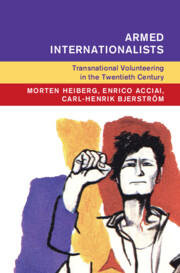Refine search
Actions for selected content:
127 results
1 - Judicializing and Dissecting Communism at the “End of History”
- from Part I - Contextualizations
-
- Book:
- Moral Autopsy
- Published online:
- 18 November 2025
- Print publication:
- 30 October 2025, pp 57-92
-
- Chapter
- Export citation
Chapter 6 - Bloomsbury and Music
- from Part I - Aesthetic Bloomsbury
-
-
- Book:
- A History of the Bloomsbury Group
- Published online:
- 09 October 2025
- Print publication:
- 23 October 2025, pp 86-101
-
- Chapter
- Export citation
1 - Combatants without Borders
-
- Book:
- Armed Internationalists
- Published online:
- 19 September 2025
- Print publication:
- 09 October 2025, pp 1-18
-
- Chapter
- Export citation

Armed Internationalists
- Transnational Volunteering in the Twentieth Century
-
- Published online:
- 19 September 2025
- Print publication:
- 09 October 2025
The Right to Banality: Interwar Jewish Global Thought between Eastern Europe and the Middle East
-
- Journal:
- Nationalities Papers , FirstView
- Published online by Cambridge University Press:
- 01 August 2025, pp. 1-23
-
- Article
-
- You have access
- Open access
- HTML
- Export citation
2 - Into the Dark
-
- Book:
- Warriors in Washington
- Published online:
- 23 June 2025
- Print publication:
- 10 July 2025, pp 34-60
-
- Chapter
- Export citation
The Engineers of Children’s Fingers: Children’s Music, Soviet Internationalism, and the Problem of Ukraine’s National Instrument
-
- Journal:
- Slavic Review / Volume 84 / Issue 2 / Summer 2025
- Published online by Cambridge University Press:
- 30 October 2025, pp. 278-301
- Print publication:
- Summer 2025
-
- Article
- Export citation
Chapter 2 - Latinx Internationalism, French Orientalism, and a Nuyorican Morocco
- from Part I - Space
-
-
- Book:
- Latinx Literature in Transition, 1848–1992
- Published online:
- 10 April 2025
- Print publication:
- 17 April 2025, pp 37-53
-
- Chapter
- Export citation
20 - Benedict XV (r. 1914–1922) and the Legacy of a Wartime Papacy
- from Part IV - Theopolitics and Religious Diplomacy
-
-
- Book:
- The Cambridge History of the Papacy
- Published online:
- 28 February 2025
- Print publication:
- 20 March 2025, pp 519-543
-
- Chapter
- Export citation
2 - In the Image of Imelda
-
-
- Book:
- Cold War Asia
- Published online:
- 30 January 2025
- Print publication:
- 06 February 2025, pp 47-67
-
- Chapter
- Export citation
7 - The British Imperium
- from III - 1885–1931: The Crises of Liberalism
-
- Book:
- Modern Britain, 1750 to the Present
- Published online:
- 14 January 2025
- Print publication:
- 30 January 2025, pp 227-265
-
- Chapter
- Export citation
10 - Democracy versus Autocracy
- from Part III - East Asia since 1945
-
- Book:
- East Asian International Relations
- Published online:
- 28 November 2024
- Print publication:
- 19 December 2024, pp 280-309
-
- Chapter
- Export citation
24 - International Radicalism and Antiwar Protest
- from Part III - Global Vietnam
-
-
- Book:
- The Cambridge History of the Vietnam War
- Published online:
- 02 January 2025
- Print publication:
- 28 November 2024, pp 509-528
-
- Chapter
- Export citation
How the Abandonment of Democracy and Internationalism Has Decimated the Socialist Movement
-
- Journal:
- International Labor and Working-Class History / Volume 106 / October 2024
- Published online by Cambridge University Press:
- 14 November 2024, pp. 365-377
-
- Article
-
- You have access
- Open access
- HTML
- Export citation
Strategies or Opportunities. Trade Union’s International Quest for Social Justice
-
- Journal:
- International Labor and Working-Class History / Volume 106 / October 2024
- Published online by Cambridge University Press:
- 14 November 2024, pp. 403-413
-
- Article
-
- You have access
- Open access
- HTML
- Export citation
3 - Institutionalised Internationalism
- from Part I - Rethinking the Historiography of Musical Modernism
-
- Book:
- Musical Modernism in Global Perspective
- Published online:
- 23 May 2024
- Print publication:
- 30 May 2024, pp 107-150
-
- Chapter
- Export citation
Introduction
-
- Book:
- States-in-Waiting
- Published online:
- 09 May 2024
- Print publication:
- 16 May 2024, pp 1-26
-
- Chapter
-
- You have access
- Open access
- HTML
- Export citation
2 - Advocates of Not-Quite Independence
- from Part I - Nationalist Claims-Making
-
- Book:
- States-in-Waiting
- Published online:
- 09 May 2024
- Print publication:
- 16 May 2024, pp 56-82
-
- Chapter
-
- You have access
- Open access
- HTML
- Export citation
2 - London
-
- Book:
- Politics of the Past
- Published online:
- 05 April 2024
- Print publication:
- 11 April 2024, pp 69-103
-
- Chapter
- Export citation
Towards Development: The Yellow River project and UNRRA’s technical assistance to China, 1944–1947
-
- Journal:
- Journal of Global History / Volume 19 / Issue 2 / July 2024
- Published online by Cambridge University Press:
- 08 March 2024, pp. 301-321
-
- Article
- Export citation
